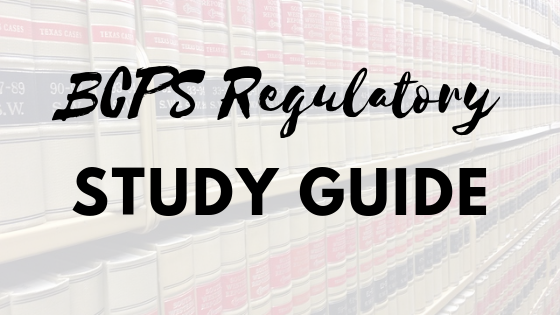Because your colleagues have requested it, the BCPS Regulatory Study Guide is now a reality! 20% of the BCPS exam is based on regulatory questions. That is approximately 30 questions! If you don’t pass your exam by a question or two, those 30 questions begin to look pretty important. Understanding the topics on the regulatory section of the BCPS exam can make or break your exam. There isn’t much study material specifically available for the regulatory section of the BCPS exam.
Problem solved. We’ve created the BCPS Regulatory Study Guide by following the BCPS content outline. In the content outline, this is also referred to as domain 3: System-Based Standards and Population-Based Pharmacotherapy.
Our BCPS Regulatory Study Guide from Meded101.com is 30+ pages of content. We’ve done the leg work of simplifying over 60+ topics that includes defining important terminology, regulatory agencies, resources, and legislation. The study guide is in PDF format and can be instantly downloaded following purchase.
BCPS Regulatory Study Guide – Content Outline
Here’s the outline of the BCPS Regulatory Study Guide from Meded101.
- Food and Drug Administration (FDA)
- MedWatch
- Center for Drug Evaluation and Research (CDER)
- Center for Biologics Evaluation and Research (CBER)
- Biologics License Application (BLA)
- Purple Book and Orange Book
- Division of Medication Error Prevention and Analysis (DMEPA)
- Institute of Safe Medicine Practices (ISMP)
- ISMP Medication Errors Reporting Program (MERP)
- ISMP Vaccine Errors Reporting Program (VERP)
- Vaccine Adverse Event Reporting System (VAERS)
- United States Pharmacopeia (USP)
- National Institute of Health (NIH)
- Agency for Healthcare Quality and Research (AHQR)
- Institute of Medicine (IOM)
- Medication Errors
- Just Culture
- The Joint Commission (TJC) or formerly, the Joint Commission on Accreditation of Healthcare Organizations (JCAHO)
- ORYX Initiative
- Accountable Care Organization (ACO)’
- National Quality Forum (NQF)
- Meaningful Use
- Conflicts of interest (ethics)
- Training Students and Residents
- Educating Healthcare Professionals and Patients
- HCAHPS – Hospital Consumer Assessment of Healthcare Providers and Systems
- LEAPFROG
- National Committee for Quality Assurance (NCQA)
- Healthcare Effectiveness Data and Information Set (HEDIS measures)
- Health Insurance Portability and Accountability Act (HIPAA)
- Centers for Medicare and Medicaid (CMS)
- Medicare Part A
- Medicare Part B
- Medicare Part C
- Medicare Part D
- Children’s Health Insurance Program
- Health Insurance Marketplace
- CMS Innovation Center
- Risk Evaluation and Mitigation Strategy (REMS)
- Elements to Assure Safe Use (ETASU) – part of the REMS program
- OSHA (Occupational Safety and Health Administration)
- Biologics Control Act of 1902
- Food and Drugs Act of 1906.
- 1938 Food, Drug, and Cosmetic Act
- Durham-Humphrey Amendment of 1951
- Kefauver-Harris of 1962
- Tamper Resistant Packaging Regulation of 1982
- Orphan Drug Act of 1983
- Prescription Drug Marketing Act (1988)
- 1993 – MedWatch Created
- Dietary Supplement Health and Education Act (DSHEA) – 1994
- FDA Modernization Act of 1997
- Medicare Prescription Drug Improvement and Modernization Act of 2003
- The Affordable Care Act of 2010 (AKA Obamacare)
- Institutional Review Board (IRB)
- PHI (Protected Health Information)
- Medication Use Evaluation (MUE)
- Formulary
- Pharmacy and Therapeutics Committee (P&T)
- Cost-Minimization Analysis
- Cost-Effectiveness Analysis
- Cost-Utility Analysis
- Cost-Benefit Analysis
- Collaborative Practice Agreement (CPA) for Pharmacists
- Scope of Practice
- Cost Containment in the Hospital Setting
- 340B Drug Discount Program
- Drug Shortages
- Drug Recalls
The really cool part about the BCPS Regulatory Study Guide is that it is FREE with the 6 month or 1 year BCPS All Access Package! The All Access package contains a 20+ hour review course, statistics study guide, 2 – 175 question practice exams, medication comparison tables, and now the BCPS regulatory study guide!
Don’t underestimate the importance of studying for the regulatory section of the BCPS exam!

